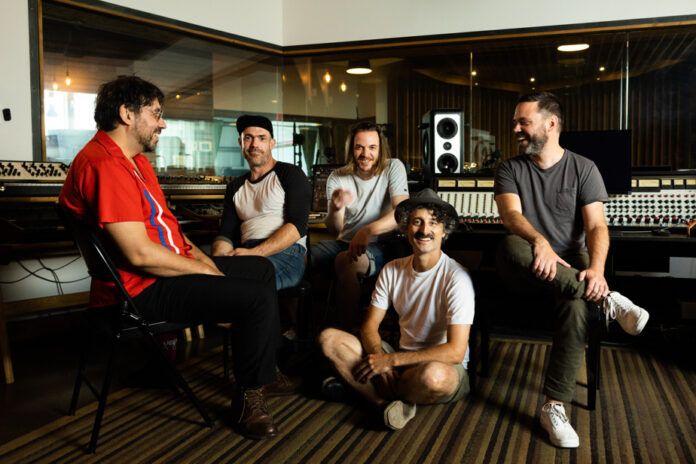The ambition of In the Second, an album that marks the return of Karkwa, is affirmed from the first minutes. Opening, piece which, obviously, launches the record, begins in a stripped-down way (drums, electronic percussion, keyboards) and, after a minute and a half, mixes its epic desires with percussions and almost noisy guitars before end with a rosary of notes emanated with elegance by François Lafontaine.
These few strumming notes bridge the gap with the following piece, Perfecte à l’screen, a fairly rock song launched in the spring which already gave a glimpse that Karkwa would not do things by halves to highlight his resurrection. They will also reappear later since, without really proposing a concept album, the quintet made up of Stéphane Bergeron, Louis-Jean Cormier, François Lafontaine, Martin Lamontagne and Julien Sagot chose to link the first songs of the record.
We find on Dans la second everything that made Karkwa great: its epic flights, its rock blasts, its atmospheric tendency and its intuitive texts with fleeting contours. Better still, the quintet expands its style by taking care of the ambiances, sometimes playing less, but brilliantly adding and juxtaposing often economical guitar or keyboard tracks. The strength of these songs lies in this way of controlling impulses and imbalances.
Karkwa is a group, its members insist. In the second is the eloquent demonstration: it is a record where everyone listens to the other, where everyone has their place, where rock desires are skillfully hijacked by lyrical flights or more experimental shifts. Without losing sight of the objective of making songs. We also find on this disc some of the most evocative and tender texts of the entire discography of the group.
A song like Point Blank, for example, accumulates images evoking the death of George Floyd, the assault on the Capitol, the war in Ukraine, the tragedy of residential schools and climate change. Then, it turns to tenderness: “And your hand that clings to mine/Hoping for the good weather to return/Outside as well as within…” Further on, in Nouvelle vague, a few more lines as simple as they are strong: “And my open green eyes/Look less towards yesterday/than before.”
By remaining himself while avoiding the trap of trying to sound like before, Karkwa signs here his best career record. A work rich in each person’s background which will constitute an eloquent conclusion if the group stops there. A more than convincing new beginning if he decides to continue the adventure, even on an occasional basis. In the second has everything it takes to earn Karkwa a second Polaris Prize. There are almost no tickets left for the upcoming tour, but we have no doubt that these songs will also shine on stage.















